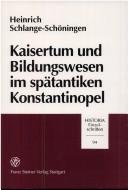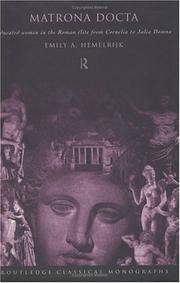| Listing 1 - 10 of 13 | << page >> |
Sort by
|
Book
ISBN: 9782251030043 2251030042 Year: 2008 Volume: 4 Publisher: Paris : Les belles lettres,
Abstract | Keywords | Export | Availability | Bookmark
 Loading...
Loading...Choose an application
- Reference Manager
- EndNote
- RefWorks (Direct export to RefWorks)
Education, Ancient --- Education, Greek --- Education --- History --- Education, Ancient - History --- Education, Ancient - Sources --- Education, Greek - History --- Education, Greek - Sources --- Education - Rome - History --- Education - Rome - Sources --- Éducation antique --- Enseignement --- Pédagogie --- Sources --- Antiquité --- Anthologies
Book
ISBN: 0567681645 0567662691 9780567662699 9780567662682 0567662683 9780567664174 0567664171 9780567662675 0567662675 Year: 2015 Volume: 536 Publisher: London: Bloomsbury,
Abstract | Keywords | Export | Availability | Bookmark
 Loading...
Loading...Choose an application
- Reference Manager
- EndNote
- RefWorks (Direct export to RefWorks)
The divisions in the Corinthian church are catalogued by Paul in 1 Corinthians 1:12: "Each of you says, 'I follow Paul,' or 'I follow Apollos,' or 'I follow Cephas,' or 'I follow Christ.'" White shows how these splits are found in the milieu of 1st-century Graeco-Roman education. By consulting relevant literary and epigraphic evidence, White develops a picture of ancient education throughout the Empire generally, and in Roman Corinth specifically. This serves as a backdrop to the situation in the Christian community, wherein some of the elite, educated members preferred Apollos to Paul as a teacher since Apollos more closely resembled other teachers of higher studies. White takes a new and different direction to other studies in the field, arguing that it is against the values inculcated through "higher education" in general that the teachers are being compared. By starting with this broader category, one that much better reflects the very eclectic nature of Graeco-Roman education, a sustained reading of 1 Corinthians 1-4 is made possible
Education, Ancient. --- Education, Greek. --- Education --- Ancient Greek education --- Greek education --- History --- Bible. --- Corinthians (Books of the New Testament) --- Criticism, interpretation, etc. --- Bible --- Criticism, interpretation, etc --- Education - Rome.
Book
ISBN: 0416857108 0416797105 9780416797107 9780416857108 Year: 1977 Publisher: London: Methuen,
Abstract | Keywords | Export | Availability | Bookmark
 Loading...
Loading...Choose an application
- Reference Manager
- EndNote
- RefWorks (Direct export to RefWorks)
History of education and educational sciences --- Antiquity --- Rome --- Education --- History --- Histoire --- history. --- Éducation --- Bildungswesen --- Erziehung --- Schule --- Onderwijs. --- Opvoeding. --- History. --- Histoire. --- Geschichte 200 v. Chr.-100. --- Römisches Reich --- Bildungswesen. --- Erziehung. --- Schule. --- Römisches Reich. --- Children --- Education, Primitive --- Education of children --- Human resource development --- Instruction --- Pedagogy --- Schooling --- Students --- Youth --- Civilization --- Learning and scholarship --- Mental discipline --- Schools --- Teaching --- Training --- history --- Education - Rome - History

ISBN: 3515067604 9783515067607 Year: 1995 Volume: 94 Publisher: Stuttgart: Steiner,
Abstract | Keywords | Export | Availability | Bookmark
 Loading...
Loading...Choose an application
- Reference Manager
- EndNote
- RefWorks (Direct export to RefWorks)
Roman history --- Istanbul [city] --- Education --- Enseignement --- Istanbul (Turkey) --- Rome --- Istanbul (Turquie) --- History --- Histoire --- -Education --- -Children --- Education, Primitive --- Education of children --- Human resource development --- Instruction --- Pedagogy --- Schooling --- Students --- Youth --- Civilization --- Learning and scholarship --- Mental discipline --- Schools --- Teaching --- Training --- -Rome --- History. --- -Istanbul (Turkey) --- Children --- Education - Rome. --- Education - Turkey - Istanbul --- Empire byzantin --- Civilisation

ISBN: 0415196930 Year: 1999 Volume: *2 Publisher: London New York Routledge
Abstract | Keywords | Export | Availability | Bookmark
 Loading...
Loading...Choose an application
- Reference Manager
- EndNote
- RefWorks (Direct export to RefWorks)
Upper class women --- Femmes de la classe supérieure --- Education --- Intellectual life --- Vie intellectuelle --- Rome --- Civilization. --- Social life and customs. --- Civilisation --- Moeurs et coutumes --- Theses --- History. --- Intellectual life. --- Rome (Italy) --- History --- Femmes de la classe supérieure --- Women --- Education&delete& --- Civilization --- Social life and customs --- Upper class women - Rome - History. --- Upper class women - Education - Rome - History. --- Upper class women - Rome - Intellectual life.
Book
ISBN: 9780199781546 0199781540 Year: 2013 Publisher: Oxford: Oxford university press,
Abstract | Keywords | Export | Availability | Bookmark
 Loading...
Loading...Choose an application
- Reference Manager
- EndNote
- RefWorks (Direct export to RefWorks)
In thirty chapters, The Oxford Handbook of Childhood and Education in the Classical World presents current research in a wide range of topics on ancient childhood, including sub-disciplines of Classics that rarely appear in collections on the family or childhood such as archaeology and ancient medicine. Contributors include some of the foremost experts in the field and younger, up-and-coming scholars. Unlike most edited volumes on childhood or the family in antiquity, this collection also gives attention to the late antique period and whether (or how) conceptions of childhood and the life of children changed with Christianity. The chronological spread runs from archaic Greece to the later Roman Empire (fifth century C.E.). Geographical areas covered include not only classical Greece and Roman Italy, but also the eastern Mediterranean.
Children --- Education, Ancient --- Education, Greek --- Education --- History --- Rome --- Greece --- Social conditions --- Education, Ancient. --- Education, Greek. --- Social conditions. --- Children. --- Education. --- Social history. --- To 1500. --- Greece. --- Rome (Empire). --- Ancient Greek education --- Greek education --- Childhood --- Kids (Children) --- Pedology (Child study) --- Youngsters --- Age groups --- Families --- Life cycle, Human --- Children - Rome --- Children - Greece - History - To 1500 --- Education - Rome --- Rome - Social conditions --- Greece - Social conditions - To 146 B.C.
Book
ISBN: 9789004506183 9004506187 9789004506190 9004506195 Year: 2022 Publisher: Leiden; Boston : Brill,
Abstract | Keywords | Export | Availability | Bookmark
 Loading...
Loading...Choose an application
- Reference Manager
- EndNote
- RefWorks (Direct export to RefWorks)
This book explores how introductory methods shaped school practice and intellectual activity in various fields of thought of the Early Imperial Age and Late Antiquity. The isagogical crossroads-the intersection of philosophical, philological, religious and scientific introductory methods-embody a fascinating narrative of the methods regulating ancient readers' approach to authoritative texts and disciplines. The strongly innovative character of this book consists exactly in the attempt to explore isagogical issues in a wide-ranging and comprehensive perspective-from philosophy to religion, from medicine to exact sciences-with the aim of detecting connections, reciprocal influences, and interactions shaping the intellectual environment of the Early Imperial Age and Late Antiquity.
Philosophy, Ancient. --- Classical philology --- Education --- Philosophy --- History --- Study and teaching --- Porphyry, --- Rome --- Intellectual life. --- Saturnalia (Macrobius, Ambrosius Aurelius Theodosius) --- Isagogics --- Philosophy, Ancient --- Early works to 1800 --- Criticism --- Classical philology - History --- Philosophy, Ancient - Early works to 1800 --- Education - Rome --- Philosophy - Study and teaching - Rome --- Rome (Italy) - Intellectual life --- Isagogics. --- History. --- Early works to 1800.
Book
ISBN: 9789004172487 1282949454 9786612949456 9047425952 9004172483 9789047425953 Year: 2010 Volume: 35 Publisher: Leiden: Brill,
Abstract | Keywords | Export | Availability | Bookmark
 Loading...
Loading...Choose an application
- Reference Manager
- EndNote
- RefWorks (Direct export to RefWorks)
The collection of writings known as the Corpus Hippocraticum played a decisive role in medical education for more than twenty-four centuries. This is the first full-length volume on medical education in Graeco-Roman antiquity since Kudlien’s seminal article of 1970. Most of the articles in this volume were originally presented as papers at the XIIth International Colloquium Hippocraticum in Leiden in 2005.
Medical education --- History --- Hippocrates --- Galen --- Influence --- Technique --- Medical personnel --- Professional education --- Education --- Claudius Galenus --- Galien, Claude --- Galenus --- Galeni --- Galeno --- Hippokrates --- Hippocrate --- Abuqrāṭ --- Ippocrate --- Ipoḳrat --- Hippocrates, --- Ypocras --- היפוקראטס --- بقراط --- Hipócrates --- Galen, Claudius --- Galenus, Claudius --- Galen, --- Galénos --- Galen, Klavdiĭ --- Galinus --- Galiʼenus --- Galiʼeno --- Galiʼenu --- Galien, --- Galeno, Claudio --- جالينوس --- Γαλῆνος --- Galênós, --- Pseudo-Galenus --- Medical education - Greece - History - To 1500 - Congresses --- Medical education - Rome - History - Congresses --- Hippocrates - Influence - Congresses --- Hippocrates - Technique - Congresses --- Galen - Congresses
Book
ISBN: 3534060733 9783534060733 Year: 1976 Volume: 377 Publisher: Darmstadt: Wissenschaftliche Buchgesellschaft,
Abstract | Keywords | Export | Availability | Bookmark
 Loading...
Loading...Choose an application
- Reference Manager
- EndNote
- RefWorks (Direct export to RefWorks)
History of education and educational sciences --- Antiquity --- Education, Greek --- Education --- Church and education --- Education grecque --- Eglise et éducation --- History --- Histoire --- 37 <09> --- -Church and education --- -Education and church --- Ancient Greek education --- Greek education --- Children --- Education, Primitive --- Education of children --- Human resource development --- Instruction --- Pedagogy --- Schooling --- Students --- Youth --- Civilization --- Learning and scholarship --- Mental discipline --- Schools --- Teaching --- Training --- Geschiedenis van opvoeding en onderwijs --- Education, Greek. --- History. --- -Geschiedenis van opvoeding en onderwijs --- 37 <09> Geschiedenis van opvoeding en onderwijs --- -Ancient Greek education --- Education and church --- Eglise et éducation --- Education - Rome --- Church and education - History
Book
ISBN: 128327762X 9786613277626 0520948408 9780520948402 9781283277624 9780520255760 0520255763 0520296184 Year: 2011 Publisher: Berkeley: University of California press,
Abstract | Keywords | Export | Availability | Bookmark
 Loading...
Loading...Choose an application
- Reference Manager
- EndNote
- RefWorks (Direct export to RefWorks)
This fascinating cultural and intellectual history focuses on education as practiced by the imperial age Romans, looking at what they considered the value of education and its effect on children. W. Martin Bloomer details the processes, exercises, claims, and contexts of liberal education from the late first century b.c.e. to the third century c.e., the epoch of rhetorical education. He examines the adaptation of Greek institutions, methods, and texts by the Romans and traces the Romans' own history of education. Bloomer argues that whereas Rome's enduring educational legacy includes the seven liberal arts and a canon of school texts, its practice of competitive displays of reading, writing, and reciting were intended to instill in the young social as well as intellectual ideas.
Latin language --- Education, Humanistic --- Education --- Classical languages --- Italic languages and dialects --- Classical philology --- Latin philology --- Children --- Education, Primitive --- Education of children --- Human resource development --- Instruction --- Pedagogy --- Schooling --- Students --- Youth --- Civilization --- Learning and scholarship --- Mental discipline --- Schools --- Teaching --- Training --- Study and teaching --- History. --- History --- Study and teaching&delete& --- Enseignement --- Littérature latine --- Histoire et critique. --- Education - Rome - History --- Education, Humanistic - History --- Latin language - Study and teaching - History --- ancient rome. --- athens school. --- classical pedagogy. --- composition. --- curriculum. --- education. --- formal education. --- grammar. --- greek education. --- hellenism. --- humanities. --- imperial rome. --- latin studies. --- liberal arts. --- liberal education. --- literacy. --- manhood. --- manly character. --- manual. --- nonfiction. --- pedagogy. --- reading. --- recitation. --- rhetoric. --- roman empire. --- roman school. --- self control. --- writing. --- youth.
| Listing 1 - 10 of 13 | << page >> |
Sort by
|

 Search
Search Feedback
Feedback About UniCat
About UniCat  Help
Help News
News